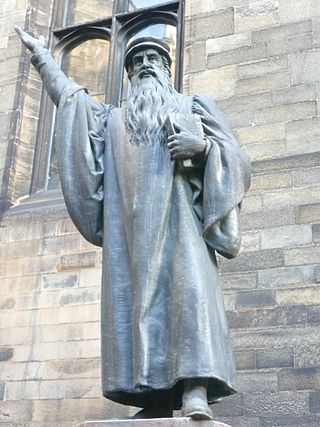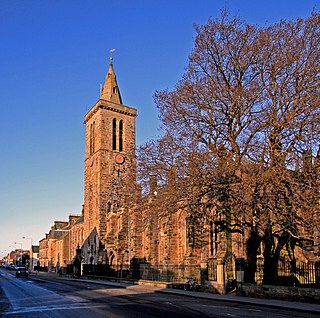
David Mather Masson, was a Scottish academic, supporter of women's suffrage, literary critic and historian.

Scottish literature is literature written in Scotland or by Scottish writers. It includes works in English, Scottish Gaelic, Scots, Brythonic, French, Latin, Norn or other languages written within the modern boundaries of Scotland.
Gordon Donaldson was a Scottish historian.
Sir Herbert John Clifford Grierson, FBA was a Scottish literary scholar, editor, and literary critic.

Sir Iain Richard Torrance, is a retired Church of Scotland minister, theologian and academic. He is Pro-Chancellor of the University of Aberdeen, Honorary Professor of Early Christian Doctrine and Ethics at the University of Edinburgh, President and Professor of Patristics Emeritus at Princeton Theological Seminary, and an Extra Chaplain to Her Majesty Queen Elizabeth II in Scotland. He was formerly Moderator of the General Assembly of the Church of Scotland, Dean of the Chapel Royal in Scotland, and Dean of the Order of the Thistle. He is married to Morag Ann, whom he met while they were students at the University of St Andrews, and they have two children.

Adam Jack Aitken was a Scottish lexicographer and leading scholar of the Scots language.

The Scottish Reformation was the process whereby Scotland broke away from the Catholic Church, and established the Protestant Church of Scotland. It forms part of the wider European 16th-century Protestant Reformation.

The Chair of Scottish History and Literature at the University of Glasgow was founded in 1913, endowed by a grant from the receipts of the 1911 Scottish Exhibition held in Glasgow's Kelvingrove Park, as well as donations from the Merchants House of Glasgow and other donors. The chair has been held by a number of prominent historians of Scotland, including two Historiographers Royal. Although the chair is now based within the Department of History, it retains its original title.
Donald Elmslie Robertson Watt FRSE was a Scottish historian and Professor Emeritus at St Andrews University.

Charles Sanford Terry was an English historian and musicologist who published extensively on Scottish and European history as well as the life and works of J. S. Bach.
Alexander Broadie, Scottish philosopher, emeritus professor of logic and rhetoric at Glasgow University. He writes on the Scottish philosophical tradition, chiefly the philosophy of the Pre-Reformation period, the 17th century, and the Enlightenment.
William Croft Dickinson, CBE MC was a leading expert in the history of early modern Scotland and a writer of both children's fiction and adult ghost stories.

The Renaissance in Scotland was a cultural, intellectual and artistic movement in Scotland, from the late fifteenth century to the beginning of the seventeenth century. It is associated with the pan-European Renaissance that is usually regarded as beginning in Italy in the late fourteenth century and reaching northern Europe as a Northern Renaissance in the fifteenth century. It involved an attempt to revive the principles of the classical era, including humanism, a spirit of scholarly enquiry, scepticism, and concepts of balance and proportion. Since the twentieth century, the uniqueness and unity of the Renaissance has been challenged by historians, but significant changes in Scotland can be seen to have taken place in education, intellectual life, literature, art, architecture, music, science and politics.

Education in early modern Scotland includes all forms of education within the modern borders of Scotland, between the end of the Middle Ages in the late fifteenth century and the beginnings of the Enlightenment in the mid-eighteenth century. By the sixteenth century such formal educational institutions as grammar schools, petty schools and sewing schools for girls were established in Scotland, while children of the nobility often studied under private tutors. Scotland had three universities, but the curriculum was limited and Scottish scholars had to go abroad to gain second degrees. These contacts were one of the most important ways in which the new ideas of Humanism were brought into Scottish intellectual life. Humanist concern with education and Latin culminated in the Education Act 1496.

Thomas Martin Lindsay FRSE (1843–1914) was a Scottish historian, professor and principal of the Free Church College, Glasgow. He wrote chiefly on church history, his major works including Luther and the German Reformation (1900), and A History of the Reformation (1906–1907).

The Royal Court of Scotland was the administrative, political and artistic centre of the Kingdom of Scotland. It emerged in the tenth century and continued until it ceased to function when James VI inherited the throne of England in 1603. For most of the medieval era, the king had no "capital" as such. The Pictish centre of Forteviot was the chief royal seat of the early Gaelic Kingdom of Alba that became the Kingdom of Scotland. In the twelfth and thirteenth centuries Scone was a centre for royal business. Edinburgh only began to emerge as the capital in the reign of James III but his successors undertook occasional royal progress to a part of the kingdom. Little is known about the structure of the Scottish royal court in the period before the reign of David I when it began to take on a distinctly feudal character, with the major offices of the Steward, Chamberlain, Constable, Marischal and Lord Chancellor. By the early modern era the court consisted of leading nobles, office holders, ambassadors and supplicants who surrounded the king or queen. The Chancellor was now effectively the first minister of the kingdom and from the mid-sixteenth century he was the leading figure of the Privy Council.

The history of universities in Scotland includes the development of all universities and university colleges in Scotland, between their foundation between the fifteenth century and the present day. Until the fifteenth century, those Scots who wished to attend university had to travel to England, or to the Continent. This situation was transformed by the founding of St John's College, St Andrews in 1418 by Henry Wardlaw, bishop of St. Andrews. St Salvator's College was added to St. Andrews in 1450. The other great bishoprics followed, with the University of Glasgow being founded in 1451 and King's College, Aberdeen in 1495. Initially, these institutions were designed for the training of clerics, but they would increasingly be used by laymen. International contacts helped integrate Scotland into a wider European scholarly world and would be one of the most important ways in which the new ideas of humanism were brought into Scottish intellectual life in the sixteenth century.
Richard G. Rodger, FRHistS, FAcSS, is a historian specialising in the urban, economic and social history of modern Britain. Previously Professor of Urban History and Director of the Centre for Urban History at the University of Leicester, and from 2007-2017 Professor of Economic and Social History at Edinburgh University.
Michael Anderson, OBE, FRSE, FBA is an economic historian and retired academic. He was Professor of Economic History at the University of Edinburgh between 1979 and 2007.
Angus Mcintosh, was a British linguist and academic, specialising in historical linguistics.











